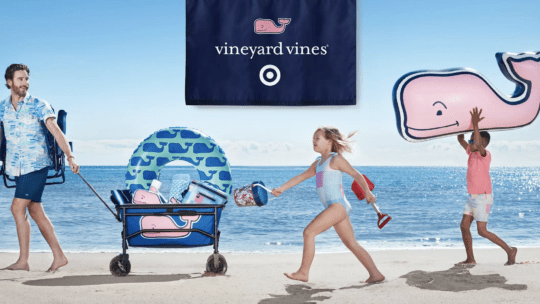
At least once a year, mega-retailer Target teams up with a brand that may be unreachable economically or regionally for super fans. Hearty Hunter boots, preppy designer Lilly Pulitzer, established luxury brand Missoni, and emerging designer Jason Wu are only a few of the successful limited-time product partnership rollouts for Target.
Unfortunately a temporary partnership also means a limited amount of merchandise for sale. Target’s latest frenzy with the preppy outfit, Vineyard Vines, began at 3 a.m. on Saturday, and sold out numerous pieces in only minutes.
Hop on over to Twitter or Facebook to hear from unsatisfied customers voicing their distaste with the lucky purchasers, who are now making a buck reselling the coveted merchandise on eBay for about what the pieces would cost in an actual Vineyard Vines store.
These limited time releases can do a number of things for Target, or really any other brand who is looking to create a splash in the marketplace. But is it worth it? Is it worth riling up loyal customers for a few days of publicity?
The FOMO Game is Real
Every marketer knows one of the fastest ways to make something “cool” or “chic” is to make it almost unattainable. Remember the girl in high school who was the first to get a car, or the “IT” bag that wasn’t available yet at your mall? The more consumers cannot have something, the more they want it. When we do get what we want, purchasers find a fleeting sense of achievement, and the dopamine cycle rages on.
Social media makes this even more immediate, of course. Instead of just seeing someone at work or school with something that we want, the coveting happens on Instagram, Snapchat and Facebook. Influencers often play a large part in keeping this heartbeat going, but during a limited-time partnership, the amount of publicity garnered from everyday people celebrating their rare hauls is priceless enough.
Appealing to the Audience
Does playing with the hearts and minds of a consumer brand stir up a recipe for disaster? A broad-based consumer brand may be inclined to say no. Not everyone shopping at Target purchases clothes. Not everyone covets preppy polo shirts with little smiling whales on the chest.
In contrast, not everyone purchasing this Vineyard Vines merchandise may be a regular Target shopper. Some more entrepreneurially-inclined individuals may be looking at this partnership as an opportunity to make a few bucks on eBay. Some may be superfan shoppers looking to score custom pieces they will only be able to get at Target instead of their Vineyard Vines store.
The only real way to determine audience behaviors is to follow the data afterward, as well as historically research these partnership sales to see what is/isn’t working. If Target received complaints and bad press before regarding sell-outs of these limited-edition items, they don’t seem to be worrying about it too much. All that seems to matter is that the brand continues these limited-run, branded partnerships at a successful rate, and shoppers keep coming back.
